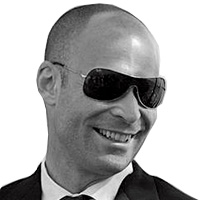Today, Christians all around the world are celebrating Easter. Future diabetic children everywhere are filing into church pews wearing their best clothes and sporting big chocolate smiles. And throughout the day, plastic eggs with prizes inside will be meticulously searched for, and jelly beans and marshmallow Peeps will be as numerous on kitchen counters as those legendary loaves and fishes on the shores of Bethsaida.
I always loved Easter when I was a little kid, mainly because of the cornucopia of candy I received upon waking. But on another level I also looked forward to the promise of renewal represented by all the flowers, bunnies, and eggs—all symbols of new growth after a long period of winter funk. I loved exploring nature, and the bigger message of Easter for me was: Spring has sprung!
In all seriousness, though, Easter is celebrated in remembrance of the most important event in the Christian faith—the resurrection of Jesus Christ. This event represents the promise of a new life for the believer in both the here-and-now and the afterlife. For believers, only God can redeem all the suffering, injustice, ugliness, and daily frustration of earthly life.
For me today, it’s not fear of the sin of Gluttony that prevents me from gorging myself on a basket of colorful confections—it’s primarily my middle-aged metabolism—and of course the fact that I’m an atheist.
Admit it—you’re probably thinking that we nonbelievers wake up late on Easter Sunday, keep the shades drawn all day, and drink bitter black coffee while we sit around and recite sections of The God Delusion or The End of Faith. And maybe throw eggs at passersby on their way to church.
Well, good news! While I don’t believe in the divinity of Jesus any more than I believe in the Easter Bunny, believe it or not, I still celebrate the symbolism of Easter—but in a secular way.
Non-believers like me obviously don’t buy into the need for personal salvation in an afterlife, but we nevertheless still want and need the redemption of this life. We still have to put up with all the crap life throws at us, from road bumps in our careers and personal relationships to being denied some pizza just because we want to share our love with someone of the same sex. And of course, we still acknowledge and endure all the natural and human-wrought devastation swirling around us.
But if we can’t turn to an all-powerful, all-loving God, what can we do? It's actually pretty simple. It turns out that an understanding of and appreciation for a naturalistic account of the universe in which we “live and move and have our being” is just what the Easter Bunny ordered.
I was raised in Christian fundamentalism, but after years without any experience of the divine in my life—despite many tearful teenage nights pleading with Jesus to help me with my sinful nature and to give me even the smallest sign of his presence—I drifted toward atheism. I experienced more of a spiritual presence while watching Led Zeppelin’s The Song Remains the Same film than I ever did at church, to be honest.
And while exposure to Western philosophy and comparative religion courses in college continued to nourish the skeptical seed in me, it was the study of naturalistic philosophers after college that helped me realize why I never received a response to my urgent nocturnal pleas—there simply is no supernatural realm for a God to occupy. Nature is all there is.
America's native philosopher, Ralph Waldo Emerson, believed we would benefit from a more seamless relationship with nature. He once wrote “Too feeble fall the impressions of nature on us to make us artists. Every touch should thrill. Every man should be so much an artist, that he could report in conversation what had befallen him.” Achieving that isn’t easy—if those impressions were too feeble 175 years ago, they’re almost undetectable now that we’re surrounded by a shell of concrete and steel, covered by a blanket of wireless radio waves.
You don’t have to be a hippy throwback and go live on some commune to capture those sentiments. Nature is still there—really, you can Google it!—and it’s all around us, even in our largest cities. And our attitude is something we can change wherever we are, even in the virtual reality cocoon that increasingly surrounds us.
“Time and nature yield us many gifts,” continued Emerson, “but not yet the timely man, the new religion, the reconciler, whom all things await.” But we don’t have to wait for that, either. We don’t have to put all our hopes in one Easter basket, or focus on only one ritual at one time of the year.
Though no one person can redeem the world for us, we can look and see how others have done it before us. Friedrich Nietzsche is my patron saint of renewal. He once asked us to imagine our reaction to the idea that our lives and everything that’s happened to us will recur exactly the same way for eternity. He wanted to know how well disposed toward life we’d have to be to declare such a scenario divine. Divine! He was encouraging us to aim for the “ideal of the most high-spirited, alive, and world-affirming human being who has not only come to terms with what was and is,” but who wants all of that repeated into eternity.
The significance of this little thought experiment isn’t whether it’s true, but how we respond to it. Do we love our life so much that we’d want it to eternally recur? Sure, on a day like today we’d want the eternal recurrence of Cadbury Eggs and a savory Easter ham, but we’d also have to have the eternal return of all the pain and suffering we’ve been through. It’s a tough sell, but if we can commit to it, we stand to gain everything a Christian Easter can reasonably deliver in the present—and maybe even more. Follow the patron saint of renewal’s logic a little further:
“If we affirm one single moment, we thus affirm not only ourselves but all of existence. And if our soul has trembled with happiness and sounded like a harp string just once, all eternity was need to produce this one event—and in this single moment of affirmation all eternity was called good, redeemed, justified, and affirmed.”
We don’t need to wait for science to tell us whether or not the universe is infinite and allows for the eternal recurrence of everything. For nonbelievers, redemption is a lifelong, daily project, an intentional commitment to making life new every day. Every day can be an Easter of renewal if we approach it with the right frame of mind.





